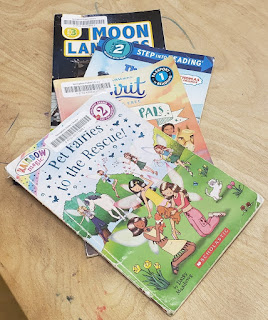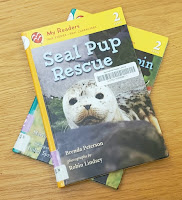Publisher Reading Levels: Helpful or Confusing?
When I set out to write this post on publisher reading levels (“leveled readers” from this point on), I had no problem putting my own thoughts in order, but I needed the Great Brain to weigh in on the matter. So, I polled the ALSC listserv and the Oregon Library Association’s Children’s Services Division listserv and 250 of you responded. Surprise! Librarians have feelings about leveled readers.
The Survey:
Question one addressed the organization of leveled readers within libraries. Almost all libraries responded that they separate leveled readers into their own section of some kind. Over half of the respondents said they do not divide by any level, while a third reported having created their own leveling system. Less than 5% of respondents report dividing their leveled readers by the publisher levels.
Question two asked about your experience with leveled readers. 93% said that the levels are inconsistent, and 67% reported the levels confusing. About 20% of respondents said that the levels are helpful in some way, but about 44% reported the levels being troublesome for both patrons and staff.
Question three addressed your observations of patrons, both adults and children, with leveled readers. The most common observations by a significant margin were an adult telling a child a book was too easy or difficult for them and general confusion over the levels not being consistent. 30% of respondents reported witnessing a child return a book to the shelf because it wasn’t their level, while less than 10% saw a child find “just the right book” using the levels.
Question four was an open ended, “Anything else you’d like to share...” question; 83 people responded.
The Results:
The overwhelming consensus is that if there was a way for the levels to be consistent among publishers, then having leveled readers would be quite helpful. Many libraries have developed their own criteria and assign levels to these books in-house to mitigate confusion for patrons, but this takes time, effort, and money.
There is also a general consensus that the levels can be beneficial in certain situations. Librarians teach patrons to open the book and analyze the text when selecting titles with or for their emergent readers. They also explain that a “Step into Reading” book is going to be completely different than a “I Can Read” book, and how to differentiate the brands.
Some librarians are in favor of ridding the world of leveled readers altogether, likening them to other dreaded quantifying systems like Lexile, AR, etc. Multiple librarians expressed frustration with both leveled readers and these other systems, noting that there seems to be an over-reliance on levels and an expectation that all books will be clearly labeled by difficulty. The anecdotal result is a less independent and motivated reader.
What do we want? An industry standard! How do we get it? We have no idea!
Hey, HarperCollins? Penguin Random House? National Geographic? We need to talk. We appreciate what you’re trying to do with your leveled readers, but we can’t make sense of your criteria, and sorting out one Level 1 from another publisher’s Level 3 is exhausting. Maybe you’re trying to build brand loyalty, but you’re doing readers a disservice. What we want more than anything is an industry standard, but we’re not sure how to go about making that happen.
The Verdict
I doubt any of this discussion comes as a surprise, but rest assured you are not alone in your frustration. While we try and figure out how to convince publishers to work together (we might be here a while), reach out to colleagues and see how they handle their leveled reader collection. Do you have an in-house leveling system working well? Share the criteria! Leveled readers won’t be disappearing any time soon, so perhaps our job is to make those waters easier to navigate.
So, are publisher reading levels helpful? They’re confusing and inconsistent, but still provide a modicum of guidance. Simply put, there’s a lot of room for improvement.








Hi Jamie, thanks for sharing! I'm super fascinated by your library's system. How do you handle books that aren't given a GRL? Do you level them in house? Are they shelved in a separate section?
ReplyDeleteWe level them ourselves. Often you can "google" the book title and find where someone else has leveled them. There are also websites out there, like Scholastic Book Wizard, that have books leveled already. It's a little challenging learning how to level books, but once you learn it, it's kind of second nature.
ReplyDelete